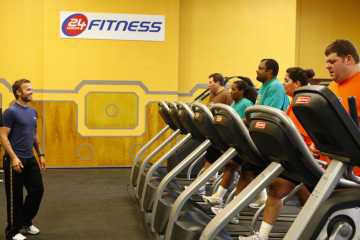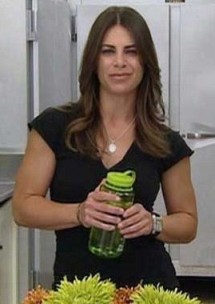Egregious Product Placement: The Biggest Loser
 Subway. 24 Hour Fitness. Extra sugar free gum. Ziploc. Muir Glen organic canned tomatoes. All of these have enjoyed prominent product placement within episodes of The Biggest Loser…this season…which is only four episodes long thus far. Biggest Loser‘s use of such extensive (and obvious) product placement offers an excellent example of promotional practices within reality TV.
Subway. 24 Hour Fitness. Extra sugar free gum. Ziploc. Muir Glen organic canned tomatoes. All of these have enjoyed prominent product placement within episodes of The Biggest Loser…this season…which is only four episodes long thus far. Biggest Loser‘s use of such extensive (and obvious) product placement offers an excellent example of promotional practices within reality TV.
Since the early days of radio, broadcasters and writers have asserted that product placement is best suited to unscripted programming (think game shows, talk shows, and now reality TV). The belief is that overt integration of promotions disrupts the narrative flow of scripted programs, when audiences are asked to suspend disbelief for awhile to dwell in an imagined environment. And so we are now more likely to see Survivor cast members competing to win Doritos and Mountain Dew than we are to see the cast of Law & Order interviewing suspects while sipping Diet Coke. Mind you, scripted series have their fair share of product placement (think of Jack Bauer driving a Ford…or Hyundai, this season), but the approach tends to be more subtle than in reality programming. Biggest Loser provides perhaps the most overt product placement I’ve ever seen (and I’ve seen a lot). Here are just a few examples from the first four episodes of season 9.
The most recent episode saw trainer Bob take the competitors to Subway for a treat! Because you can get lean protein and complex carbohydrates in Subway subs! And all the veggies you want! They’re the perfect pre-workout snack!
Celebrity chef Curtis Stone taught the contestants how to cook a healthy meal, one which integrated Muir Glen organic canned tomatoes. One participant was so enamored of the product, she enthused, “I’m going to put these tomatoes in everything now!”…and then giggled awkwardly.
 In each episode, trainers Bob and Jillian give the competitors “Trainer Tips” on how to live healthier. Tips have included: chew Extra sugar free gum when you want a treat! When you buy all that great produce, don’t let it spoil–put it in Ziploc bags! Everyone needs to drink water when they work out, and it’s so easy to do when you have Brita water bottles with a water filter built right in!
In each episode, trainers Bob and Jillian give the competitors “Trainer Tips” on how to live healthier. Tips have included: chew Extra sugar free gum when you want a treat! When you buy all that great produce, don’t let it spoil–put it in Ziploc bags! Everyone needs to drink water when they work out, and it’s so easy to do when you have Brita water bottles with a water filter built right in!
There are many (many!) more, and they all include my very favorite element: the awkward interviews with the contestants, who rave and gush over the product and how great it is. (Think: “Boy, this Extra gum really is pretty tasty!” and the aforementioned Muir Glen enthusiastic giggle.) It’s not that I don’t think the contestants are being sincere, it’s just that they’re not actors–they’re there to lose weight and get healthy. Once put on the spot to work as shills for promotional purposes, they are no longer their ordinary, likeable selves–they become wooden and artificial in a way that offers an extreme disconnect from the personalities on display throughout the rest of the series.
I realize that all of the above makes me sound awfully cynical about these promotional moments, but I don’t mean to be. The truth is that The Biggest Loser just presents an extreme and amusing example of product placement on contemporary network TV. Extreme because there’s simply so much of it–American Idol‘s placement of Ford and Coke has nothing on this. Amusing because it’s done so artificially–though clearly meant to seem natural, the execution is too fake-y and eye-roll-inducing to come across as entirely organic or sincere. Ultimately, although shows like Idol and Survivor get a lot of press for their product placement, to my mind, there is no greater practitioner of these strategies than The Biggest Loser.



Where it’s particularly problematic with TBL, though, is in what it means for a viewer’s *trust*. When I see Bob telling people to eat at Subway when I know that lots of their sauces are clearly fattening, it challenges the trust I’m supposed to have in Bob and Jillian and the show as a whole. One’s forced to wonder, for instance, if Hamburger Helper paid enough, would Jillian demand that it can be healthy?
In that respect, it’s way more jarring than on many other programs. Sure, Simon and Randy and Paula obsessively drinking Coke is amusing and garish on American Idol, but it doesn’t make me question their judgment. Nor do Doritos on Survivor make me wonder if there’s actually a 7-11 on the island that we don’t see. But Biggest Loser is playing a high risk game with its product placement.
That’s a good point, Jonathan. I suppose I hadn’t really considered it, since the products they’re hawking do seem to be more or less healthy or health-related. In fact, I could see Jillian plugging McDonald’s “healthier options” menu, if the opportunity arose. In both that fictional example and the real Subway example, it would make sense for them to skirt the issue of some of the less healthy options, right? But perhaps to not mention them at all makes it more problematic? I wonder, if Bob had said, “Skip the meatball sub with cheese and stick to the lean meats, veggies, and whole grain breads,” would that have made it more palatable (forgive the unintended pun)?
It’s just kind of duplicitous in intent. When McDonalds announce they have healthier options, they’re hoping we’ll make the elision and think McDonalds is healthy. Ditto with Subway — if you lather mayo and mustard and ranch on your sandwich, it’s not healthy, regardless of the veggies. So without that rejoinder, as Myles notes below, they’re being thoroughly dishonest through selective honesty.
Here is the real kicker that I found out this weekend. The contestants take a bite of said product for the camera and then get their mouths washed out! no swallowing, that food is not allowed on the campus for consumption. They never eat subway, they never chew gum, and they don’t have any little jello pudding deserts! I doubt if they even really use that biggest loser brand protien powder? I heard this from an interview with ron morelli season 7.
I’m with Jonathan in that what makes the Biggest Loser so interesting is that it is the most “branded” reality show in existence. While they want to create a narrative of the show being about losing weight, in reality the show exists to sell products relating to the show (video games, branded food items, the aforementioned placed products), which occasionally comes across as borderline dishonest.
And yet, although this forces me to admit I’ve watched the show in recent weeks (Scrubs and Better Off Ted were pre-empted! It wasn’t my fault!), the “game” itself often comes into conflict when that same dishonesty (this season found in a contestant who managed to lose no weight in two weeks, and was accused of “throwing” weigh-ins, which she angrily denied) is vilified within gameplay. As Jillian told her, she doesn’t care if she’s just playing the game to stay in it longer: that’s totally within the rules. She just wanted her to be honest, is all.
And based on Jonathan’s comment, we ask whether the show is actually being honest in terms of its position as a giant sales machine, and whether that dishonesty is apparent enough to regular viewers to be seen as a point of mistrust.
Somewhere in here there is a dissertation chapter called “The Jared Effect”. The entire Subway brand is based on being “healthier” fast food. Note, not healthy nor is it health food. The Biggest Loser and Subway fit perfectly in modern American minds because Subway’s branding over the last decade has been based around a “big loser” who wins because he makes a “smart choice” and takes personal responsibility by “walking every day”. The narrative of the game is dovetails a larger brand text that had already established the game.
And, well, Subway is pretty great.
OK I’m in sync here, but one minor wrinkle in a historical sense. Sponsorship has changed from radio days in that the participants gushing are not paid talent. The one who loves the tomatoes, is she hawking the tomatoes or hawking herself as someone who loves organics and all it’s ‘bourgie’ associations? Is she branding herself for the next program’s casting? I have no clue but something to consider.
I’ve long gone past pretending I know just how each reality contestant thinks, as that’s a job for their future therapists, but I do think it’s important to acknowledge that many consider a platform like The Biggest Loser as a potential springboard to future pursuits. If they lose enough weight, or become famous enough in the process of trying to lose weight, they might be able to snag a small endorsement deal out of their time on the show, and that might be easier if they proved themselves to be adequate salespeople in the context of the show.
In other instances, they might just be grinning and bearing it for the sake of being on the show, as they’re surely contractually obligated to say some good things about the sponsors in question (or at the very least offer some honest opinions that can then be misconstrued as the editors see fit).
Good question, Vicki. I’ve always just assumed that more than being asked/required/whatever to endorse a product, contestants simply understand that it’s the “proper” thing to do. You’re on a show, you understand the show is contractually obligated to promote Muir Glen tomatoes, so when they ask you what you think of the tomatoes, what are you going to do? You’re going to say they’re great, probably. (And especially, I think, if you’re the type of person who wants to be on a reality show. You’re not out to “stick it to the man” by appearing on reality TV of this type, right?)
This is actually what I meant when I said, above, that it’s not that I don’t believe the contestants are being sincere, it’s just that their reactions seem phony because, in a way, they are. They’re “acting” enthused because they understand they’re supposed to be enthused.
Mind you, a more cynical viewer might think they’re contractually obligated to gush over tomatoes…but I honestly don’t think that’s the case.
As a viewer, I love the awkward product placement moments– they are the funniest thing about TBL (except, maybe, Jillian’s increasingly frequent and tearful “come to Jesus” talks with the contestants– oh, the DRAMZ). Almost all of the products placed on TBL, however, have really dubious health benefits. Take the organic tomatoes, for example, which Prevention magazine has recently warned are the number one MOST dangerous food to eat because tomatoes soak up the BPA from their cans’ plastic liners and deliver a ton of the horrible chemical straight to the consumer. Or the sugar-free gum, which is full of terrible chemicals and additives. Duplicitous, indeed.